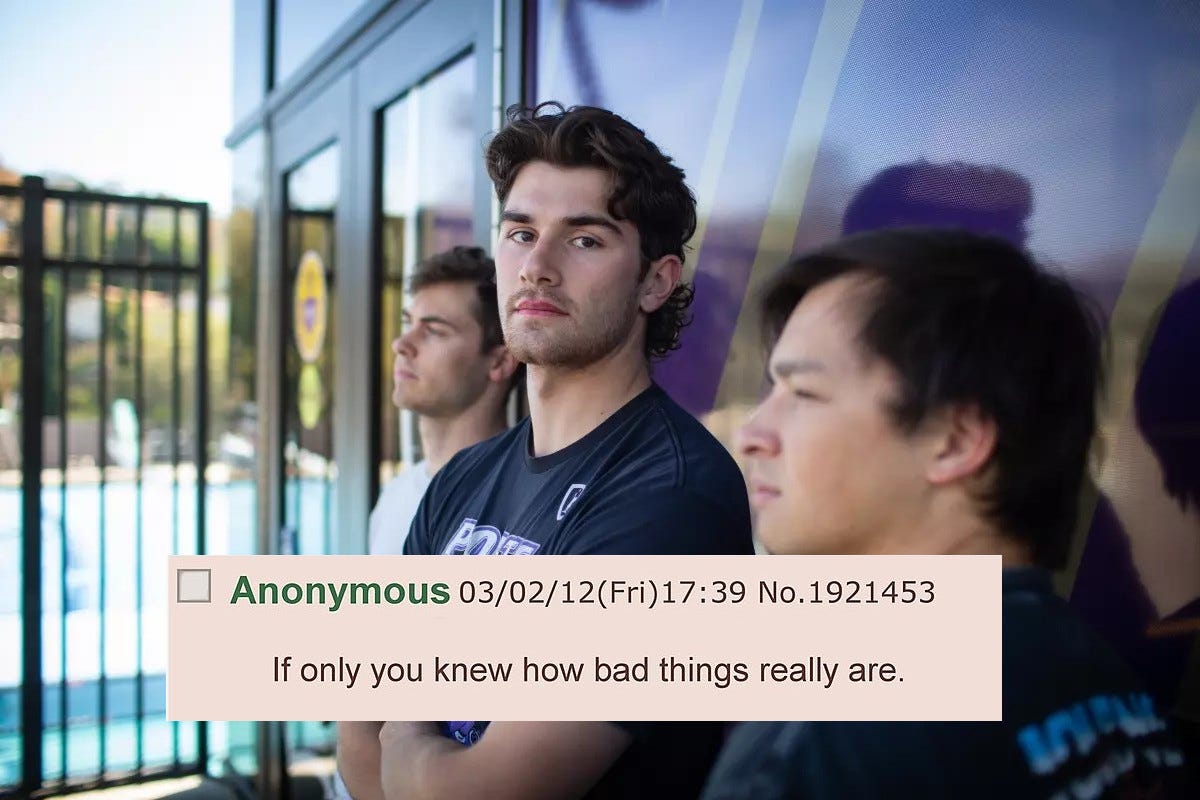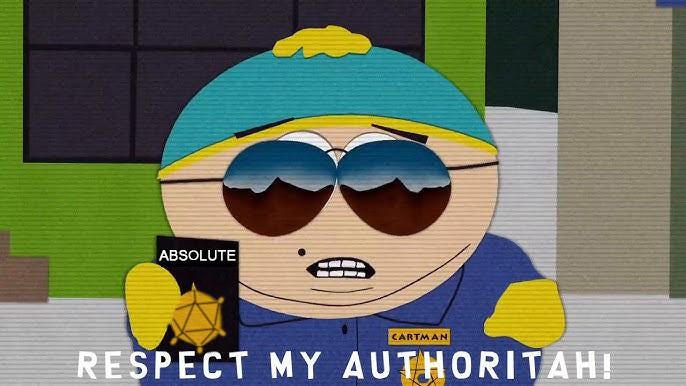Crumbling DIEvory Towers
Every aspect of the academic polycrisis illustrated in a tour of the ruins on either side of the Atlantic
While I like to jump around subject matter here, in order to keep myself – and you – from getting bored, one topic that I return to regularly (as a dog returns to his vomit, as a sow returns to her mire) is the ongoing polycrisis in higher ed. You may have noticed, as I just wrote about this a week ago. Academia Is Women’s Work created a bit of a buzz. It seems to have struck a nerve with a lot of people, both with those who have observed the same things that I’ve noticed, and who had the same ‘ah-hah!’ moment that I did once the phenomenon of male flight was connected to the myriad symptoms of academic decay that we all know so well; and with those (mainly women, naturally) who reacted with sputtering outrage – misogynist! incel! – when my Xitter thread on the subject went viral and broke containment in the basedosphere. Despite quite a few hostile eyeballs on the thread, the only thing they could find to correct was a grammatical typo (*its!) in the opening tweet.
When writing about the DIEvory Tower I usually keep it very general, as the problems are systemic, affecting the entire sector, and the view from orbit avoids giving the impression that the issues are specific to any one institution. But a couple of stories recently came to my attention which are simply too perfect not to share with you. Each of them provides a sort of holographic totality of the academic polycrisis, illustrating all of the afflictions in specific, personalized detail.
The first was shared with me by
as we were preparing for my second appearance on his podcast The Carousel, to discuss the aforementioned Xitter thread1. It’s a great episode, by the way; you should absolutely click through and give it a listen.The title of this article really says it all: Plunging enrollment, financial woes, trustee exodus. Whittier College confronts crisis. It’s a bit out of date now – it was published about a year and a half ago – but the subject matter remains timeless. It has everything: infrastructural decay, forced diversity, incompetent and corrupt administration, a terrified faculty, accusations of racism, collapsing enrolment, angry alumni, reduced donations, budgetary problems. It’s all there.
Whittier College is a small liberal arts school in California, founded in the 19th century by abolitionist Quakers, and known mainly for being President Richard Nixon’s alma mater. It has seen better days:
[T]he once-bustling quad is often all but empty these days, students say, and inside the Wanberg Hall dormitory, carpets smell musty, the Wi-Fi is spotty, and 25 students share two restrooms with toilets that frequently break down and take ages to fix. The eerie quiet outside and fetid bathrooms inside are signs of the turmoil roiling one of California’s oldest liberal arts colleges.
Imagine spending $49,000 a year to use fetid bathrooms.
Enrolment and revenue have both collapsed over a very short timespan:
Since 2018, enrollment has plummeted by about 35%, from 1,853 students to about 1,200, according to college figures. Annual revenue has plunged by 29% over roughly the same period, audited financial statements show. ... This term, faculty report the number of undergraduates is just 1,027.
The athletics programs are being sacrificed:
Partly to save money, Whittier cut football and three other sports programs last year.
One of the other teams that got shut down was lacrosse, which is a very white sport. Sheer coincidence, probably. “Partly to save money,” though, huh.

The president of Whittier College is one Linda Oubré. Oubré has an MBA from Harvard Business School, previously served as a dean at College of Business at San Francisco State University, has worked as a consultant, was president of a teeth-whitening spa, and is also – and this surely the most important line item on her curriculum vitae – professionally qualified as a black woman. Given these impeccable credentials, it will be no surprise to learn that Whittier’s problems commenced immediately upon Oubré taking the helm.
Linda Oubré, who took office in July 2018 as Whittier’s first Black president, has championed diversity and depicted Whittier as entrenched with pockets of racist attitudes. Her critics say the college has long supported diversity and the problem is mismanagement.
“We have some questions about your management style.”
“That’s racist.”
The board of trustees is falling apart:
Since late February, five of 25 board members have left. Three resigned, two of whom were first suspended and then quit, alleging that the board had tried to silence them for asking questions about enrollment and finances. Another two trustees left under circumstances that could not be determined. ... Since Oubré took office, more than 20 trustees resigned during their term or chose not to stand for reelection, and the board is now seeking its fourth president.
Alumni have closed their wallets:
[C]ollege records show that the percentage of alumni who give to the university slumped from 25% in the 2017-18 fiscal year, before Oubré arrived, to 11% in 2020-21.
Oubré is not above a little nepotism.
In 2021, the college hired Oubré’s son, Nate Oubré, as director of innovation and new ventures to help generate revenue. His LinkedIn profile shows no work experience in the field of education; his previous job was managing an initiative to “modernize and innovate” a janitorial services company.
I understand how one modernizes a company – this is at least grammatically sensible – but how does one ‘innovate’ a company? What does that even mean? One suspects that Nate Oubré may not be the sharpest pencil on the desk, though such speculation is probably doing a racism. I’m sure he’s extremely qualified for a position intended to develop innovative new methods of revenue generation at a school, despite having no academic background: the obvious proof of this is that the school is facing a collapse in revenues. His mammy being president definitely has nothing to do with his getting hired; speculations along such lines are also probably doing a racism.
Oubré is very concerned about people doing racisms:
For a decade, more than half of Whittier’s undergraduates have been people of color. But in an hour-long talk at a South by Southwest education conference earlier this month, Oubré told attendees she encountered attitudes at Whittier such as, “‘We can’t have too many Hispanics,’ whatever, fill in the blank, ‘because the white kids won’t be comfortable.’”
It seems very unlikely that any of the faculty at a contempory liberal arts college would have dared to suggest that the potential discomfort of white students was something to be avoided – yes, I’m saying that I think Oubré just made that up – but it’s revealing that she thinks that saying that people saying that the white kids might be uncomfortable with too much diversity is an own. The white kids are supposed to be uncomfortable! Also: a greater-than-fifty-percent non-white student body, in a country that is (for now) majority white, is apparently an insufficient level of diversity. Sufficient diversity is zero white people. But we already knew that.
It is not only the student body that must be Our Greatest Strengthened:
Oubré moved to diversify leadership and faculty. She said that the college has hired two Black male PhDs, one of whom is on a tenure track, and that she promoted to her leadership team a transgender man, a Black woman and a Latina.
Ostentatious diversification of this sort serves at least three functions. First is the bioleninist loyalty function: the successful diverse candidate understands without having to be told that she owes her positions to her diversity, thereby ensuring her ironclad loyalty to the system that put her in place, as well as to the specific people who hired and promoted her. Second is as a protective screen: to criticize the person who hired the diverse is to criticize the diversity they hired, and doing that is doing a racism, a misogyny, a homophobia, and a transphobia, and you don’t want to do that, so shut your mouth.
Of course, Oubré is absolutely not above escalating her own race card to the hate hoax level.
In her talk at South by Southwest, Oubré said she has “received death threats that are racialized.” She told The Times that she and others at Whittier, including board members, have received threats, and that those are under investigation by campus security working with local law enforcement.
A Whittier Police Department spokesperson told The Times on March 21 that it had no reports of threats made against Oubré, the university or the Board of Trustees.
Oubré: “Hey, if it worked for Jussie Smollett...”
Whittier police: “Hmm, we remember Jussie Smollett...”
The police are now just rolling their eyes at this kind of thing, and even reporters in Los Angeles are getting exasperated enough with it that they’re openly calling bullshit on a professional black woman’s unsubstantiated hate hoax.
The third function of diversity is to install a zampolit: the credentialed midwits2 will act as political police and Stasi snitches to keep the rest of the workforce in line. Sure enough:
Some former board members, alumni and others charge that Oubré’s administration has stifled dissent and instilled a culture of fear. “People are afraid to voice their opinions, because it is a very toxic and punitive environment that they’re living in right now,” said Rachel Homel Rice, who was president of Whittier’s Alumni Assn. from 2004 to 2008. In its letter to the board, the Whittier College chapter of the American Assn. of University Professors said many faculty members didn’t sign because they “fear personal or programmatic retaliation.”
With the faculty terrified into silence, it falls on the alumni association to try and do something about it. Oubré is not above legal threats:
Alumni and others have formed a group called Save Whittier College, which has criticized Oubré’s leadership. ... Lawyers for Whittier and the Board of Trustees have sent two cease-and-desist letters to a prominent member of the group ... The first letter demanded that Robison stop all communication with Oubré, and the second demanded that she “cease making statements or engaging in other conduct that undermines President Oubré’s reputation, authority and position.”
Pro tip: if you need to pay your lawyer to send nastygrams demanding your authority be respected, you don’t have any legitimate authority.
Two months after that article was published, Oubré finally resigned. It’s too early to know whether the new president, Dr. Kristine Dillon, will turn things around. She’s an actual academic, as well as an alumna of Whittier College, so presumably her heart is in the right place, she won’t be nakedly vindictive and blatantly corrupt, and she won’t go out of her way to antagonize the other alumni. On the other hand, statistically speaking, she’s probably an AWFUL3, meaning that she will be morally powerless against the ideological currents that are dragging the academy under since, in general, she is probably in favour of them. Most likely scenario: she’ll have some success arresting Whittier’s decline, meaning that she’ll bring it in line with the somewhat less precipitous decline of the broader sector, but she won’t really be able to turn it around.
Time will tell.
If our first act was farce, the second is tragedy. It was brought to my attention by Aether Czar
(to whom you should subscribe), and concerns a far more venerable and storied institution than Whittier College, a name recognized around the world as synonymous with the most elevated echelons of scholarship: none other than Cambridge University.Decline and fall: how university education became infantilised is an elegy from a Cambridge scholar who has grown heartsick at what has happened to his beloved home.
Last month, after 21 years studying and teaching Classics at the University of Cambridge, I resigned. I loved my job. And it’s precisely because I loved the job I was paid to do, and because I believe so firmly in preserving the excellence of higher education, in Britain and beyond, that I have left.
Male flight in action. I suspect we’ll be seeing a lot of this over the coming years. The author, David Butterfield, is was a Cambridge Fellow in the Classics department, and has a long history (as you can see at that link) of opposing academia’s iDIEological suicide. He’s one of the good ones.

Cambridge has always been something distinct from the common run of universities. Most operate according to a lecture model: mobs of undergraduates sit as silent, passive data receptacles before a professor who either bores them to comatose tears or does his best to edutain them. Cambridge has always used a very different, much more intimate, hands-on model:
The so-called ‘supervision system’ is the beating heart of this: each week students (especially in the arts, humanities and social sciences) are sent away to read up and write on a single question. The challenge is to take a position, craft an argument, and be prepared to defend it during an hour’s discussion with an expert in the field. Under such scrutiny students learn where the inconsistencies of their position lie and develop the intellectual humility and adaptability that are the lifeblood of academic research.
Standard practice at modern universities is to base a student’s grade on some combination of homework assignments, project work, attendance, classroom participation, in-class quizzes, midterm exams, and final exams. Not Cambridge:
Cambridge students’ performance is measured by examination – which, crucially, was for centuries a public matter. The results, posted as class lists on Senate House, were also published in the press.
Basing a grade on a high-stakes final is as much an emotional test as it is a test of knowledge: can you remain calm in a high-pressure situation? This tends to favour a more masculine style of intellectual engagement, since girls tend to be better about turning in their homework on time, but suffer more from test anxiety. The trend in recent years has been to de-emphasize exams and give more weight to factors like homework and class participation, because of course, a feminized academy must cater o feminine strengths.
Publishing the results of high-stakes exams is cruel to those who do not do so well. Since the DIEing Academy prioritizes succour of underperforming over celebration of the excellent, those public exam results had to go.
A few years ago, Cambridge’s class lists became private. University administrators alleged grounds of ‘data protection’, after a minority of students campaigned under the banner of ‘our grade, our choice’. What was first an opt-out for students soon became uniform policy. No longer can undergraduates discover who did best (or worst) in their cohort, their subject, their college – even academics are given limited access to results, based upon their role. The desire to save students personal embarrassment has thus snuffed out much of the competitive spirit of the university.
Competition is toxic masculinity, you know.
Did it ever enter the minds of the administrators and faculty who were so concerned about the hurt feelings of fail children that by ceasing to publish the exam results, they were depriving those who had excelled of a moment of triumph that they would remember for the rest of their lives? Of course it didn’t. They are concerned with the low, not the high.
If having your exam results made public knowledge is potentially embarrassing, high-stakes examinations themselves are plainly too nerve-wracking for the delicate hothouse orchids of the feminized student body, thus Cambridge is following suit with the rest of the academic sector and reducing the stakes:
Now even the fate of examinations hangs in the balance. There is a strong push, from students, administrators and a clutch of academics, to reduce or remove the traditional closed-book exam, which tested knowledge, ingenuity and (where appropriate) rhetoric under the real pressures of time and circumstance. Not only have many exams become open-book exercises to be carried out from students’ rooms, but there has been a marked increase in coursework. Naturally this is less stressful for students, but few see the irony of having their final academic grade being based upon earlier, i.e. less learned, versions of themselves. Meanwhile, the university has no clue whatsoever about how to deal with the rampant use of illegitimate, but increasingly undetectable, AI software.
Butterfield makes a very good point, that final exams test one’s actual level of mastery. Homework assignments evaluate, at best, how quickly one can learn, and in practice, are more of a measure of diligence. Emphasizing homework over exams favours conscientious head girls, while disfavouring lazy but brilliant boys, who are often more inclined to blow off their homework because they’re confident they can breeze into the examination hall and ace the test.
The point about Large Language Models is worth pausing on. It’s simply obvious that the only way to compensate for the ability of LLMs is to evaluate students in person, where one can verify that they aren’t asking ChatGPT for the answer. That means a return to the old methods of oral interviews and timed, hand-written exams under the gimlet eye of a stern-looking (but secretly incredibly bored) invigilator. Nothing else will do. Even requiring hand-written homework assignments is no guarantee: a student can simply copy by hand what the AI has written, and there’s no way to prove that she didn’t write it herself. AI has made homework effectively useless, at precisely the time that the feminized academy is emphasizing homework. The irony.
Naturally, standards have collapsed:
Grade inflation is rampant in Cambridge, as elsewhere in the sector. A third-class performance, let alone a failure, is almost impossible in most subjects, as students can either intermit for the year and take the exams again, or avoid them on health grounds and be given an effective pass. ... [I]t is now unheard of for students to be sent down for insufficient academic performance.
What matters is how the students feel. Failing them makes them feel bad, so you can’t do that. If they felt bad during the exam – maybe it was that time of month – you need to let them have a do-over, on their time, when they feel up to it. Or not, you know, you do you, you don’t actually have to take the exam. Everyone’s a winner, and they’ll be given as many attempts as they need to get the credential that certifies them as a bona fide winner.
Asking to take the exam again in order to try for a better mark isn’t the only dodge:
[F]or various reasons declarations of disability have spiked dramatically. Over the past 15 years, disability at Cambridge has increased more than fivefold, and is now declared by some 6,000 students (roughly one in four). The two major areas of growth have been ‘mental health conditions’ and ‘specific learning difficulties’. ... Many students are now excused from writing essays and permitted to submit bullet points; deadlines are extended, and regularly missed without penalty; extra time is given for all examinations.
Imagine getting full credit for bullet points.
This dramatic increase in mental health isn’t just happening at Cambridge, but is endemic across the academic sector, and indeed more broadly through society. There are probably a few things going on here. The mental health crisis amongst young people, particularly young women, and most particularly liberal young women (who comprise about half of Cambridge’s student body), is well known, and probably at least partly a consequence of social media and smart phones. At the same time, the victim worship prevailing on university campuses teaches young people to wallow in whatever emotional or psychological challenges they face, instead of learning to be resilient and engage in a praxis of self-overcoming: in other words, the ideological environment inside academia is crazy-making, especially when you add it to such notions as ‘you’re really a boy on the inside’ and ‘you’re white so you need to hate yourself’. The administrative indulgence of ‘anxiety disorders’ and ‘learning disabilities’, with extra time on tests and so forth granted to anyone claiming a diagnosis, is a further incentive to identify as disabled, since this provides a direct competitive advantage over those of one’s able-minded peers who still respect themselves enough so as to not feign insanity.
The pace of change over the past decade has been astonishing, driven on by three forces: an administrative class that wants to minimise complaints, a subset of academics who actively resent the no-nonsense traditions of the university, and a proportion of students who will take the easiest path proffered. The result is a steady infantilisation of education, whereby challenging workloads are reduced, and robust criticism of bad writing and bad thinking is avoided.
Academics have their role to play in this, with many finding ways to advance their careers by chewing away at the foundations of the institutions that make their careers possible, but by and large the organizational subversion of the university has been accomplished using a classic high-and-low-against-the-middle dynamic. As representatives of the managerial class, university administrators want to centralize functions in order to increase their own power, and must therefore break down whatever institutions or customs stand in the way of this. The goal of all management is to reduce independent professionals to order-following employees. Agitated students provide them with an excuse to do so, with admin invoking the mental health of the students, the need for diversity, the imperative to accommodate and coddle them, or whatever other saccharine nonsense they can come up with, as an excuse to tear down obstacles to their power. The students, of course, benefit from an easier ride to the credentials that will assure them an easy ride through life ... though this is a short-term benefit, as it is only a matter of time before the collapsed standards underpinning those credentials become common knowledge, at which point the prestige of those credentials collapses, and they cease to be the ticket to easy street. Indeed, this has already happened.
Speaking of which:
For those in the humanities and social sciences, there is a steady narrowing of knowledge and lowering of requirements. Set texts and supervision reading lists have been circumscribed: almost never are students tasked with reading a full book within the week.
Imagine only reading one book a week. My niece, who has yet to complete elementary school on the grounds that she is not yet 10, is known to devour thick novels in a few short days. But students at Cambridge cannot be expected to read an entire book in a week?
So-called ‘content warnings’ are mandated for courses: anything supposed to portend possible controversy, such as animal sacrifice in Homer’s Iliad, or religious conflict in Late Antique Rome, needs explicit flagging in advance. And if someone says they don’t want to confront such a topic, the department quietly excuses them. The net decline of standards cannot be ignored.
Trigger warnings on literature have been ubiquitous in the humanities for over a decade, which naturally dissuades academics from including anything that might be potentially controversial, which in as time goes on is asymptotically approaching the limit of ‘everything that’s ever been written’. Again, feelz take precedence: if it gives someone the ick, they don’t have to read it. Eventually, we shall have graduates of literature programs who have never actually read a book, and are functionally illiterate (assuming that isn’t already the case (it probably is)).
At the same time that the curriculum is being diluted to homeopathic impotence, administrators are taking a ball-peen hammer to admissions standards:
The entire success of Cambridge is predicated on admitting the brightest and best students. Yet, despite this truism, a particular obsession has fallen recently on applicants’ school backgrounds – unless they are foreigners. Cambridge, like many other universities, has imposed its own self-willed targets for increasing the proportion of state-school pupils. There was no clear rationale behind the numbers chosen, but they operated with a ratchet effect: when a figure dreamt up by committee was not just met but overshot, the new figure was then treated as the baseline against which ‘we must do better’.
Butterfield doesn’t quite say so directly, but I suspect – though cannot prove – that this preference for graduates of government schools over private schools4 is a disguised form of racial affirmative action. Students hailing from the migrant battery farms in London or Burmingham probably aren’t attending expensive private academies. And note ‘unless they are foreigners’. There’s also this:
39 per cent of undergraduate students at Cambridge are ‘non-white’, compared to 22 per cent a decade ago.
A doubling of the non-white fraction in a single decade does not happen organically. Britain’s population is still about 85% white; if only 61% of Cambridge’s students are white, this is demonstrative of racial discrimination against the British by one of Britain’s oldest universities.
On the consolidation of power within the administrative bureaucracy:
The character of the college as a micro-community of academics is being doubly subverted: from within, by the rapid growth of bureaucratic roles taken up by professional administrators, and from without, by a university seeking to centralise control and elide differences among the colleges. The more uniform the overall environment becomes, the more rapidly it will suffer from the bad decisions inevitably yet to be made.
On the metastasis of overpaid, officious administrators:
‘The content of this letter is extremely important, so please read it carefully.’ It isn’t often that the university speaks to its employees in this way. This was a follow-up email from the former pro-vice-chancellor for strategy and planning, David Cardwell. He wanted academics to complete his Time Allocation Survey by tabulating how many hours were spent across a vast suite of possible activities. It is characteristic of contemporary Cambridge that the strongest rhetoric it can muster is directed toward this self-serving bureaucratic exercise. Cardwell rubbed shoulders with four other pro-vice-chancellors, all enjoying a salary that is several multiples of the typical university academic, and surpasses the Prime Minister’s.
This administrative overgrowth is, by the way, a historical novelty:
All of this is new: until 1992, the role of vice-chancellor was covered in short stints by the Heads of House, who paused their college governance while the rest of Cambridge got on with what they were here to do. Now we have not only career administrators at the helm, but their five deputies, for an annual cost of around £1.5 million. All the while, the university fails to find the money to keep important subjects alive, such as the centuries-old study of millennia-old Sanskrit.
I’ve been pointing this out for years. Until very recently, administrative functions in universities were largely filled by senior academics: you got bullied into shouldering the unwelcome burden because somebody had to do it, and you drew the short straw. There is nothing that a serious person despises more than paperwork, especially a scholar, who would much rather be happily buried in whatever esoterica he has made his field of study. Forcing academics into administrative roles ensured that the people filling those offices were incentivized to keep the paperwork to an absolute minimum; the last thing they wanted was to create more of the hateful stuff.
Enter, some decades ago, the professional administrators. Initially, these usually had some sort of academic qualification, and still largely do – albeit typically in fake non-disciplines, ‘public administration’ or what have you – but they were not in any sense scholars. They were managers. Give us your burden, they said; we’ll do all the annoying paperwork for you, and you can concentrate on your very important research, you very important scholars, you. Thus the professoriate, like gullible fools, handed over the keys to the kingdom.
Unlike professors, managers are incentivized to create as much administrative complexity as they can: the more administration there is to perform, the more administrators the institution needs, and the larger the fiefdoms senior administrators can command. Since admin typically has control of the budget, they were easily able to appropriate the necessary funds. The result has been the explosive proliferation of useless eaters with lavish salaries and ridiculous titles like Senior Vice Assistant Dean for Excellence or Junior Associate Student Life Provost. At many universities, administrators now exist in a 1:1 ratio with the student body.
Admin have sucked shrinking university budgets dry, with real intellectual consequences: they aren’t going to fire themselves, and they sure aren’t taking a salary cut, so to make up budget shortfalls academic programs with low enrolment get the axe. Butterfield’s reference to the closure of the Sanskrit program is an example of this; there are many such examples, and they are increasingly common. To brains built out of buzzwords and spreadsheets, everything is either a marketing technique or a revenue stream, and if a program isn’t popular enough to subsidize their summer vacations in Provence or social-justicey enough for them to brag to their beach friends about how progressive they are, it serves no purpose.
This ability of university administrations to close down programs illustrates something else, which is that they are the real power on campus. The academics are mere employees: they will teach whichever students the admin decides to admit, will teach those students whatever the admin says to teach them, will not teach what the admin tell them not to teach, will teach in whatever manner admin decides is best, and will evaluate the results of that instruction in whatever fashion admin mandates they be evaluated.
As members of the managerial class, university administrators are drones of the global managerial hive mind, and instinctively exert a homogenizing influence. Old, parochial practices must be jettisoned in favour of standardizing the institutions they manage.
As for our age-old titles – of lecturer, senior lecturer, reader and professor – these were replaced with American titles so as to be ‘more intelligible’ to a global audience. ... To conjure up a world of ‘assistant professors’ and ‘associate professors’, who in fact have no supporting relationship to ‘the professors’, makes a mockery of that venerable system.
Administrators dislike horizontal social relationships amongst faculty. Peer-to-peer network architectures are hard to control; they prefer a server-terminal model, with management as the server through which all communications pass, and professors as the terminals, who can be regulated through systems of permissions. Thus, they set about dissolving those institutions that facilitate conviviality amongst the faculty:
It was telling that a few years ago the authorities silently closed down the University Combination Room, the 14th-century hall in which academics could freely convene outside their individual colleges.
Administration is also sneaky, adopting governance practices that minimize whatever legacy powers the professoriate still possesses:
Although in theory Cambridge academics are self-governing, the move to online voting, with minimal announcement, allows for many university policies to be driven through by those who want them enacted.
Butterfield understands full well that the problems are hardly unique to Cambridge:
All this I say of Cambridge. But these issues go right across the university sector ... The public need to trust and respect the elite academic institutions they fund; but that respect is waning, as stories continue to reveal politicised teaching, grade inflation, authoritarian campus policies and lurid, even laughable, research grants. The ambitions of our whole education system are ultimately pegged to the achievements at the very pinnacle of academia. If Cambridge can’t resist decline, who can?
The obvious answer is: no one can resist this. Not Cambridge, not Oxford, not University College London, not Harvard, not Princeton, not MIT, and not Whittier College. The problem is too systemic; the rot too deep. Decades of administrative consolidation of power has subsumed the ivory tower into an appendage of the global asset management system. Generations of ideological infection by the mind virus of cultural Marxism, wokeism, critical social justice, gay race communism, whatever you want to call it, has poisoned the minds of too many of the faculty. Generations of steadily declining standards, an inevitable consequence of massively increased enrolment which of unavoidable necessity heavily sampled the fat middle of the IQ distribution, has thinned out the influence of the bell curve’s rarefied tail to statistical irrelevance. After all of this, the only way to save the university is to purge it, of the great mass of low-performing affirmative action students, of the diversity hire academics who substitute clumsy sermonizing for the scholarship they can neither understand nor perform, and most especially of the great tumorous mass of useless administrators.
Such a purge, to be effective, would need to be thorough. To be thorough, it would remove almost everyone in the system. This would be the same as destroying the system. To save the patient, one would have to kill the patient.
Therefore no such purge will take place.
Instead, the system will crumble, buckle under its own weight, and eventually collapse.
As, in fact, it is doing.
‘Nobody does that’ is what most colleagues, friends and family said when I handed in my resignation. That may be, but the university I leave behind with sadness is certainly not the one I entered.
Such a sentiment will seem quaint, in times to come. The best scholars are motivated, not by money or professional accolades, but by an ungovernable intellectual hunger. They delight in the cut and thrust of debate, the sense of communion from the meeting of minds, the craftsmanship of careful arguments, the long quiet hours spent extending one’s mastery of encyclopedic masses of esoteric knowledge, the blinding flashes of insight in which it feels as though all the universe’s secrets have been revealed. But the quiet halls of academe have degenerated into feminized kindergartens in which the internal discourse oscillates between the equally distasteful extremes of stultifying dogmatic conformity and shrieking hysterical insanity, a sanitarium presided over by a caste of dead-eyed mismanagerial pod people for whom ‘knowledge production’ is just another blood sack to stick their feeding probosces into.
There is nothing for such men there. Indeed, worse than nothing: to stay is to submit oneself to ongoing spiritual torture, as all that which one treasures most in the world is twisted into a travesty, one part psychotic schizoid delusion, another part cynical grift.
And so, unable to endure, such men will leave.
I have no idea what David Butterfield will do next. Perhaps he has some notion of a back-up plan; perhaps he does not, and the whole farce had simply become so unbearably tragic that he ceased to care what came next, because absolutely anything would be preferable.
Regardless, I wish him the best, as I wish the best to all those who make their exit. He is not the first, and he will be far from the last.
Thank you for taking the time to read this. I hope you found the first story as amusing as I did, and the second, as moving and insightful. If you did, and you’re of a mind to support another refugee from academia, a traitor to his class who now uses his keyboard to make common cause with the online insurgency of stochastic traditionalism (don’t think too hard about that, I didn’t), you might consider becoming a supporter.
As I alluded at the beginning, I like to explore a wide range of different subjects, everything from political theory to metaphysical speculations on the nature of consciousness to UAPs to the fertility crisis, and rather a lot more. You can get a sense of what Postcards From Barsoom is about here, where I have gathered some of my favourite articools in something resembling thematic organization:
Every Postcard From Barsoom is free, meaning that my patrons receive nothing for their generosity but the knowledge that they, as the true nobility, make it possible for the rest of you to enjoy my writing for an investment of nothing but your time (which is not to say that your time is not precious!) As always, my immense gratitude to every single one of my supporters, without home I would not be able to do this.
Did I say everything was free? Well, not quite. My punditry you may peruse without paying; for my dreams and nightmares, however, there is an entry price. Here’s a sample of the comments from my first foray into fiction:
“This is the best fiction I've read on Substack. Props.” “Holy crap dude. This is fantastic.” “That packed a wallop!” “I see some greatness in this writing, and I see this expanding beyond earth. Good, male oriented fiction is hard to come by.” “I am unsatisfied only because it ended so quickly.” “I'm ready for the movie.”
My first appearance, earlier this year, was also talking about the woman question, in particular my essay Pixel Valhalla, which remains one of my personal favourites.
Which might be giving them too much credit: technically, a midwit has an IQ in the 110-120 range, and many of this sort are well below this.
Affluent White Female Urban Liberal
And yes, I know these are called ‘public schools’ in Great Britain, where they seem to insist on giving everything confusing names.











* get accepted to elite university
* declare that you're retarded and can't do the work
* graduate with honors
* seethe when nobody takes your credentials seriously
* accept job at starbucks
* spend your evenings on reddit saying "um akshully"
* wait patiently for CNN producer to reply to your email
I live in Chicago. I have had numerous people in the recent past inform me that "women graduate from college more than men, which proves women are smarter".
I have gently informed these people that "women graduate from college more than men which proves college is dumb".
Believe it or not my thought has not been well received. BTW neither of those sentiments is NECESSARILY true.